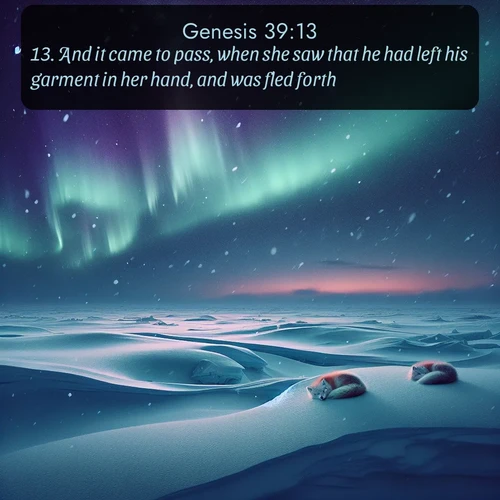Genesis 39:13 plusieurs versions / traductions
English Bible Translations
13. And it came to pass, when she saw that he had left his garment in her hand, and was fled forth,
13. And it came to pass, when she saw that he had left his garment in her hand, and was fled forth,
13. And it came to pass, when she saw that he had left his garment in her hand and had fled forth,
13. And it came to pass, when she saw that he had left his garment in her hand, and had fled forth,
13. And it cometh to pass when she seeth that he hath left his garment in her hand, and fleeth without,
German Bible Translations
13. Als sie nun sah, daß er das Kleid in ihrer Hand gelassen hatte und entflohen war,
French Bible Translations
13. Lorsqu'elle vit qu'il lui avait laissé son habit dans la main et qu'il s'était enfui dehors,
13. Lorsqu’elle vit qu’il lui avait laissé son vêtement dans la main, et qu’il s’était enfui dehors,
13. Lorsqu'elle vit qu'il lui avait laissé son vêtement dans la main, et qu'il s'était enfui dehors,
13. Et il arriva, quand elle vit qu'il lui avait laissé son vêtement dans la main et s'était enfui dehors,
13. Et lorsqu'elle eut vu qu'il lui avait laissé sa robe entre les mains, et qu'il s'en était fui,
13. Et dès qu'elle vit qu'il avait laissé son vêtement entre ses mains, et qu'il s'était enfui dehors,
Versions with Strong Codes
Genesis 39 / KJV_Strong13. And it came to pass,[H1961] when she saw[H7200] that[H3588] he had left[H5800] his garment[H899] in her hand,[H3027] and was fled[H5127] forth,[H2351]
Strong Code definitions
H1961 hayah haw-yaw a primitive root (compare 1933); to exist, i.e. be or become, come to pass (always emphatic, and not a mere copula or auxiliary):--beacon, X altogether, be(-come), accomplished, committed, like), break, cause, come (to pass), do, faint, fall, + follow, happen, X have, last, pertain, quit(one-)self, require, X use. see H1933
H7200 ra'ah raw-aw' a primitive root; to see, literally or figuratively (in numerous applications, direct and implied, transitive, intransitive and causative):--advise self, appear, approve, behold, X certainly, consider, discern, (make to) enjoy, have experience, gaze, take heed, X indeed, X joyfully, lo, look (on, one another, one on another, one upon another, out, up, upon), mark, meet, X be near, perceive, present, provide, regard, (have) respect, (fore-, cause to, let) see(-r, -m, one another), shew (self), X sight of others, (e-)spy, stare, X surely, X think, view, visions.
H3588 kiy kee a primitive particle (the full form of the prepositional prefix) indicating causal relations of all kinds, antecedentor consequent; (by implication) very widely used as a relative conjunction or adverb (as below); often largely modified by other particles annexed:--and, + (forasmuch, inasmuch, where-)as, assured(-ly), + but, certainly, doubtless, + else, even, + except, for, how, (because, in, so, than) that, + nevertheless, now, rightly, seeing, since, surely, then, therefore, + (al- )though, + till, truly, + until, when,whether, while, whom, yea, yet.
H5800 `azab aw-zab' a primitive root; to loosen, i.e. relinquish, permit, etc.:--commit self, fail, forsake, fortify, help, leave (destitute, off), refuse, X surely.
H899 beged behg'-ed from H898; a covering, i.e. clothing; also treachery or pillage:--apparel, cloth(-es, ing), garment, lap, rag, raiment, robe, X very (treacherously), vesture, wardrobe. see H898
H3027 yad yawd a primitive word; a hand (the open one (indicating power, means, direction, etc.), in distinction from H3709, the closed one); used (as noun, adverb, etc.) in a great variety of applications, both literally and figuratively, both proximate and remote (as follows):--(+ be) able, X about, + armholes, at, axletree, because of, beside, border, X bounty, + broad, (broken-)handed, X by, charge, coast, + consecrate, + creditor, custody, debt, dominion, X enough, + fellowship, force, X from, hand(-staves, -y work), X he, himself, X in, labour, + large, ledge, (left-)handed, means, X mine, ministry, near, X of, X order, ordinance, X our, parts, pain, power, X presumptuously, service, side, sore, state, stay, draw with strength, stroke, + swear, terror, X thee, X bythem, X themselves, X thine own, X thou, through, X throwing,+ thumb, times, X to, X under, X us, X wait on, (way-)side, where, + wide, X with (him, me, you), work, + yield, X yourselves.see H3709
H5127 nuwc noos a primitive root; to flit, i.e. vanish away (subside, escape; causatively, chase, impel, deliver):--X abate, away, be displayed, (make to) flee (away, -ing), put to flight, X hide, lift up a standard.
H2351 chuwts khoots or (shortened) chuts {khoots}; (both forms feminine in the plural) from an unused root meaning to sever; properly, separate by a wall, i.e. outside, outdoors:--abroad, field, forth, highway, more, out(-side, -ward), street, without.
Prédications qui analysent les thèmes Genèse 39
Thèmes : Joseph et la femme de Potiphar; Joseph en prisonL’intégrité, la serviabilité ne paient pas ! Heureusement ! Genèse 39 et 40
Related Sermons discussing Genesis 39
Themes : Joseph et la femme de Potiphar; Joseph en prisonIntegrity, helpfulness do not pay! Fortunately ! Genesis 39 and 40
see also: Bible Key Verses ; KJV Bible Images, BBE Bible images

